Top diplomats of the U.S., Russia and France have called for an immediate ceasefire between conflicting parties in the Nagorno-Karabakh region, as the clashes continued on Monday over the disputed land with major cities under attacks.
The three countries, co-chairs of a mediation group that has failed to find a political resolution to the conflict, have called for an immediate halt to the fighting. In a joint statement, U.S. Secretary of State Mike Pompeo and his Russian and French counterparts condemned the "unprecedented and dangerous escalation of violence in and outside of the Nagorno-Karabakh zone."
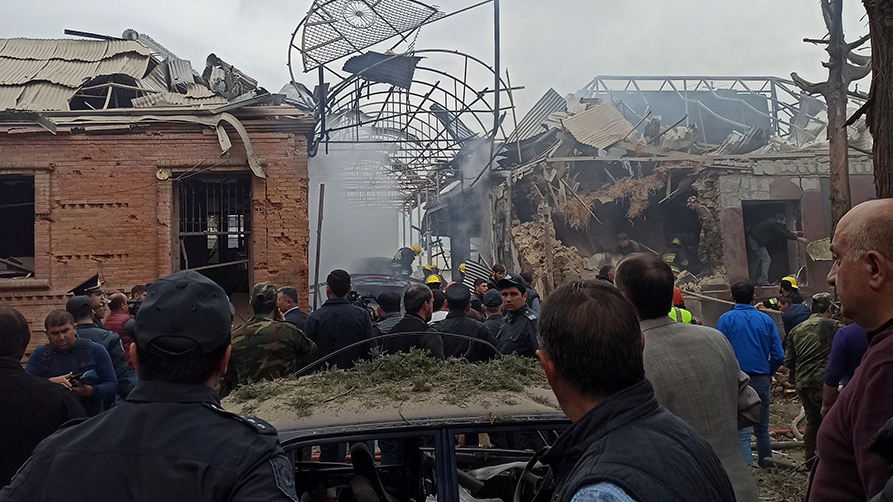
Aftermath of recent shelling during a military conflict over the region of Nagorno-Karabakh in the city of Ganja, October 4, 2020. /Reurers
Aftermath of recent shelling during a military conflict over the region of Nagorno-Karabakh in the city of Ganja, October 4, 2020. /Reurers
"The Ministers stress unconditionally that recent attacks allegedly targeting civilian centers – both along the Line of Contact and on the territories of Azerbaijan and Armenia outside the Nagorno-Karabakh conflict zone – and the disproportionate nature of such attacks constitute an unacceptable threat to the stability of the region," according to the statement. The three countries would "firmly continue to advance their engagement with the sides, and urge them to commit now to resuming the settlement process on the basis of existing core principles and relevant international documents well-known by both parties," it added.
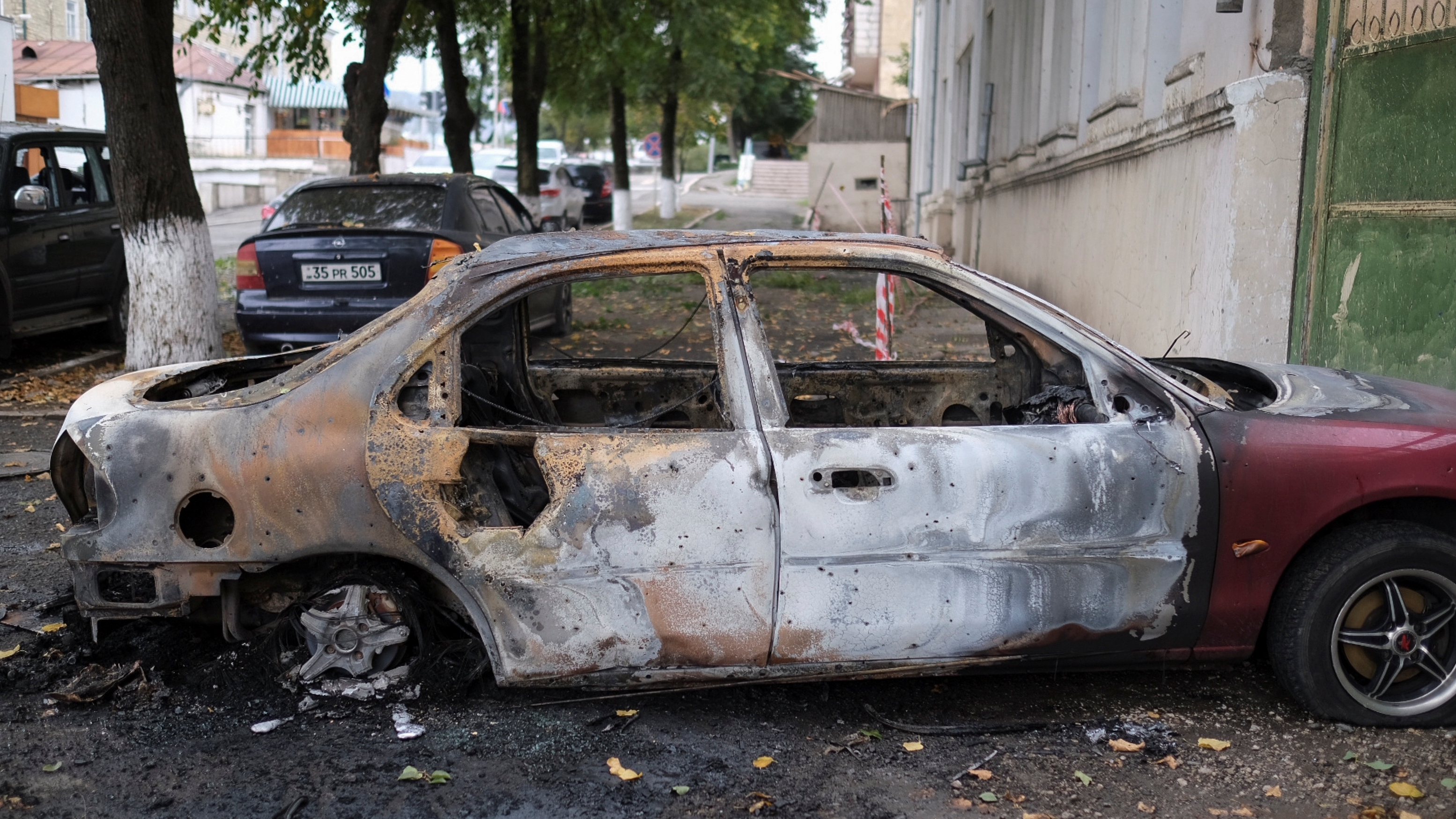
Aftermath of recent shelling during a military conflict over the region of Nagorno-Karabakh in the city of Ganja, October 4, 2020. /Reurers
Aftermath of recent shelling during a military conflict over the region of Nagorno-Karabakh in the city of Ganja, October 4, 2020. /Reurers
On Monday, Russian Foreign Minister Sergei Lavrov and French Foreign Minister Jean-Yves Le Drian held a phone conversation, emphasizing the significance of coordinated action on the Nagorno-Karabakh conflict.
The ministers thoroughly discussed the situation of the Nagorno-Karabakh conflict, expressed serious concern over the ongoing large-scale hostilities, and called on the opposing sides for an early and complete ceasefire and de-escalation of tension, read a statement released by the Russian Foreign Ministry.
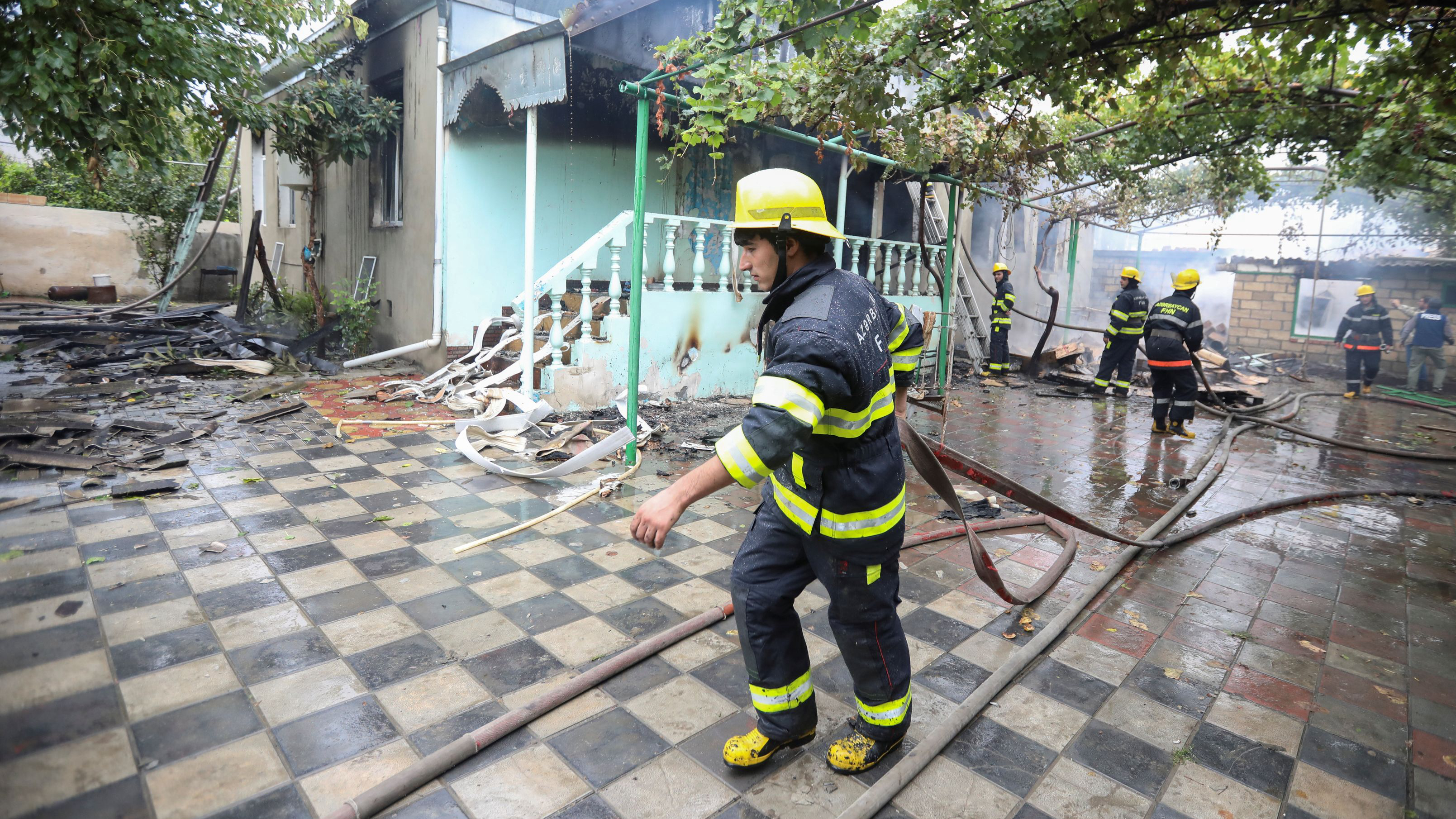
Firefighters battle a fire caused by shelling in the fighting over the Nagorno-Karabakh in the town of Barda, October 5, 2020. /Reuters
Firefighters battle a fire caused by shelling in the fighting over the Nagorno-Karabakh in the town of Barda, October 5, 2020. /Reuters
Meanwhile, U.S. Deputy Secretary of State Stephen Biegun spoke separately to the foreign ministers of Azerbaijan and Armenia and urged an immediate ceasefire in the Nagorno-Karabakh region, the U.S. State Department said. Biegun expressed deep concern over reports of the escalation of military action and expanding theater of operations in the Nagorno-Karabakh conflict.
Heavy fighting was still raging in the region as fears grew for civilians after the two sides began shelling major cities. Stepanakert, a city of 50,000 in the heart of the mountainous province, has been under steady artillery fire since Friday, with residents cramming in to underground shelters. The separatists released video footage of repeated bursts of heavy shelling and of debris from seriously damaged blocks of flats, claiming Azerbaijan had used cluster munitions.
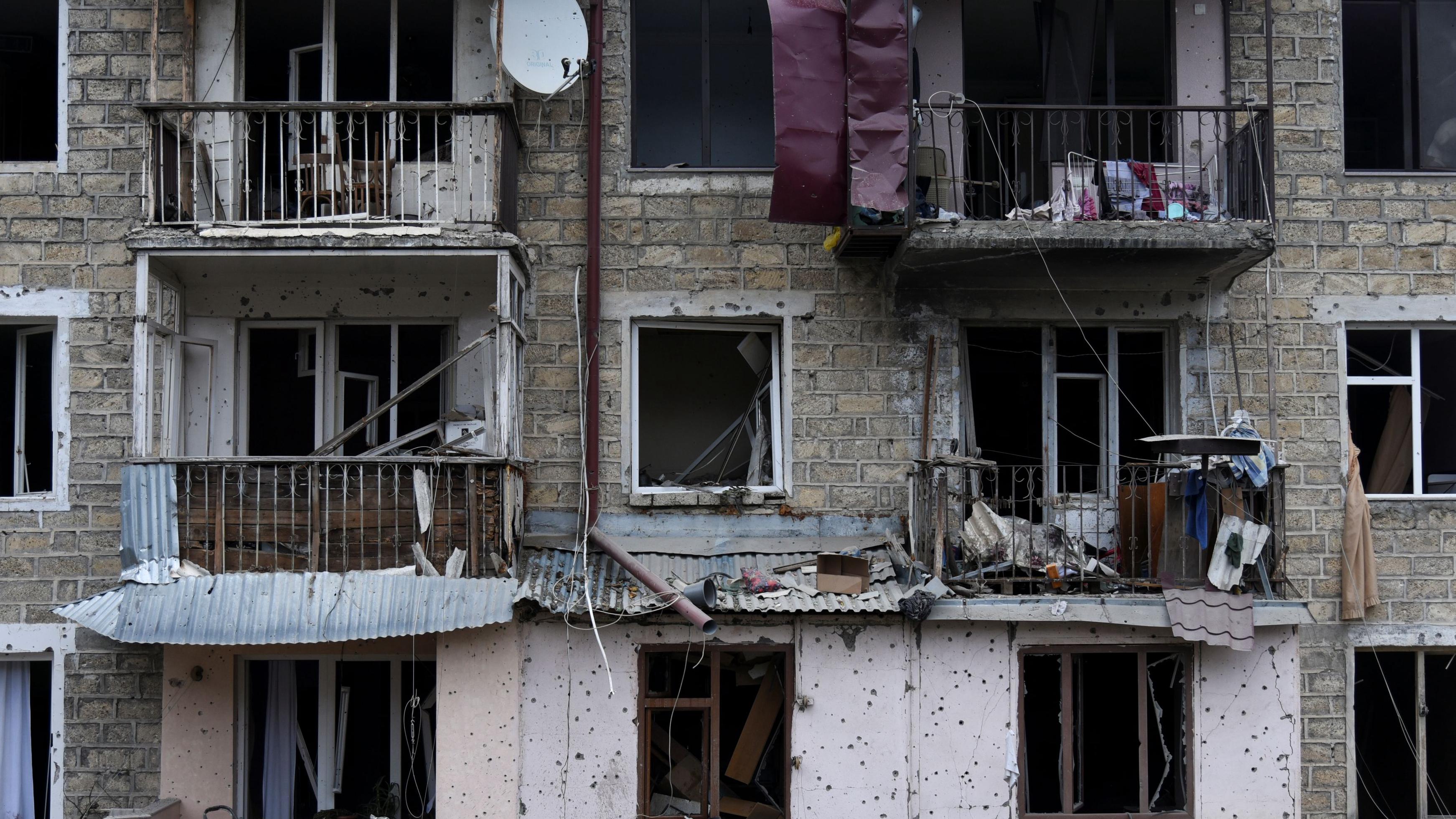
Aftermath of recent shelling during a military conflict over the region of Nagorno-Karabakh in Stepanakert October 4, 2020. /Reuters
Aftermath of recent shelling during a military conflict over the region of Nagorno-Karabakh in Stepanakert October 4, 2020. /Reuters
Azerbaijan's defense ministry said several towns were shelled heavily, including the country's second-largest city Ganja which was first hit on Sunday.
Increasing artillery fire on urban areas has raised concerns of mass civilian casualties if the fierce fighting continues to escalate. There are reportedly 266 people have died in the fighting so far, including more than 40 civilians. Most of the confirmed deaths are allegedly from Nagorno-Karabakh's separatist forces, who have reported more than 220 fatalities including 21 more on Monday. Azerbaijan has not released any figures for military casualties.
In a fiery televised speech on Sunday, Azerbaijani President Ilham Aliyev said his country has set conditions for a halt to the fighting for Armenia to accept: that is to let Armenia provide a timetable for a full withdrawal and the confrontation will be stopped. Armenian Prime Minister Nikol Pashinyan warned on Friday that Armenians were facing a "decisive moment" in their history and urged them to stand together.
The region's declaration of independence from Azerbaijan during the collapse of the Soviet Union sparked a war in the early 1990s that claimed 30,000 lives. The Organization for Security and Co-operation in Europe (OSCE) Minsk Group was formed in 1992 to find a peaceful solution to the conflict but to no avail. Talks to resolve the conflict have made little progress since a 1994 ceasefire agreement.
The clashes broke out on September 27, re-igniting a decades-old conflict between the ex-Soviet neighbors and threatening to draw in regional powers Russia and Turkey. Turkey is a strong ally of Azerbaijan, a fellow Muslim and Turkic country. It has condemned what it says is Armenian occupation in Nagorno-Karabakh.
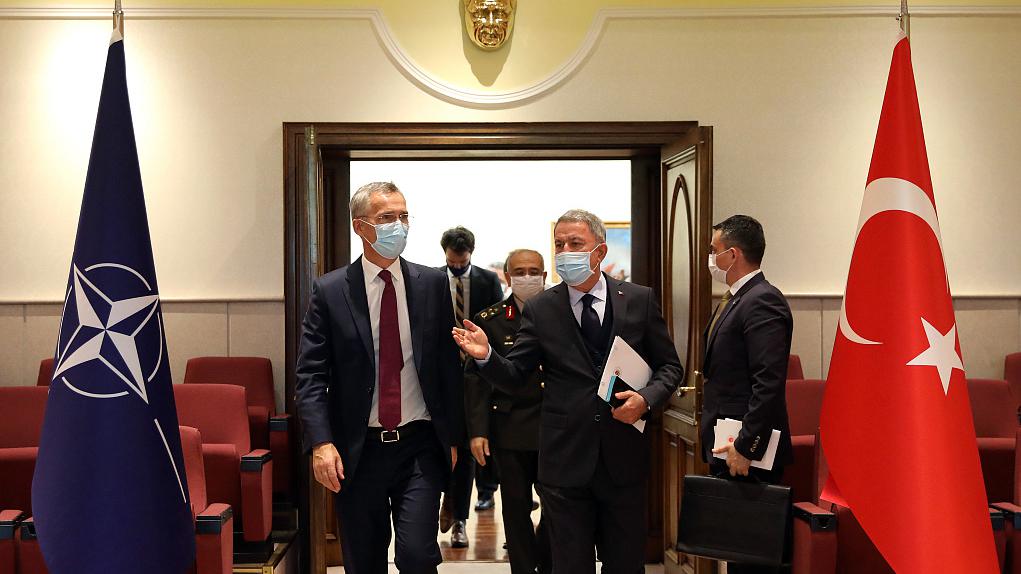
NATO Secretary-General Jens Stoltenberg and Turkey's Defense Minister Hulusi Akar on October 5, 2020. /VCG
NATO Secretary-General Jens Stoltenberg and Turkey's Defense Minister Hulusi Akar on October 5, 2020. /VCG
NATO chief Jens Stoltenberg was on his visit to Ankara on Monday, where he expressed the expectation that the alliance member Turkey to use its "considerable influence" with Azerbaijan to calm the conflict.
Stoltenberg said there was no military solution to the conflict over Nagorno-Karabakh, which belongs to Azerbaijan under international law but is populated and governed by ethnic Armenians.
(With input from agencies)